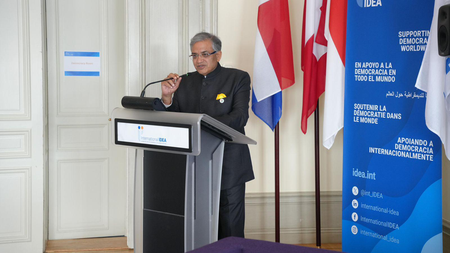Stockholm, 11 June (IANS). The Chief Election Commissioner (CEC) of India Dnyanesh Kumar, while emphasizing the country’s electoral integrity, scale and diversity, gave his main speech at the Stockholm International Election International Election Conference in Sweden and confirmed the role of India’s Election Commission (ECI) in the capacity building programs of Election Management Bodies (EMB) of countries around the world.
He said that holding elections with full honesty is a proof of our national resolve. More than 100 participants representing the election management bodies (EMB) of about 50 countries are participating in this conference. The conference is being organized by the International Institute for Democracy and Electoral Assistance (International IDEA).
Dnyanesh Kumar also informed the participants about the electoral exercises conducted by the Election Commission of India (ECI) especially during the parliamentary elections, which is done under the strict supervision of political parties, candidates, common people, police and expenditure supervisors and media.
He said that all these act like concurrent auditors in different stages. The Chief Election Commissioner also highlighted the scale of coordination, which reflects the operation of elections in India. At the time of election, polling has become the largest organization in the world, including more than 2 crore personnel, including employees, police forces, supervisors and agents of political parties, which has crossed the joint workforce of many national governments and major global corporations.
The Election Commission ensures that about one billion voters in India are able to exercise their franchise independently.
In his address at the conference, Gyanesh Kumar told about the development of the Indian election system for decades. He said how the electoral system has adopted itself with increasing complexity while being vested in constitutional values. In 1951-52, from 17 crore 30 lakh to 2024, 97 crore 90 lakh voters and in the initial years from only 2 lakh polling stations to more than 10 lakh 50 thousand voters centers, India’s election journey has demonstrated both institutional foresight and unmatched scale.
He said that 743 political parties participated in the 2024 general elections, including six national parties, 67 state level parties and other registered political parties. A total of 20,271 candidates contested using 62 lakh electronic voting machines (EVMs) across the country, which confirms the commission’s ability to hold inclusive, skilled and safe election.
Dnyanesh Kumar underlined the legal sharing of India’s voter list with all recognized political parties during the amendment every year and before the elections, which provides for claims, objections and appeals during the amendment every year and before the elections. It is one of the most rigorous and transparent processes in the world, which strengthens the accuracy and integrity of the electoral process. He said that this strong system plays an important role in maintaining electoral credibility in the entire country year after year.
On the inclusive design of the Indian elections, Gyanesh Kumar said that the election process serves with equal care and commitment to voters, senior citizens above 85 years of age, senior citizens, disabled people, third gender voters and voters from the most inaccessible areas. From one voter polling stations to the highest polling stations like Tashigang in Himachal Pradesh, India’s commitment to not leave any voter behind was repeated as a constitutional principle rather than a logical challenge.
-IANS
SK/ABM










